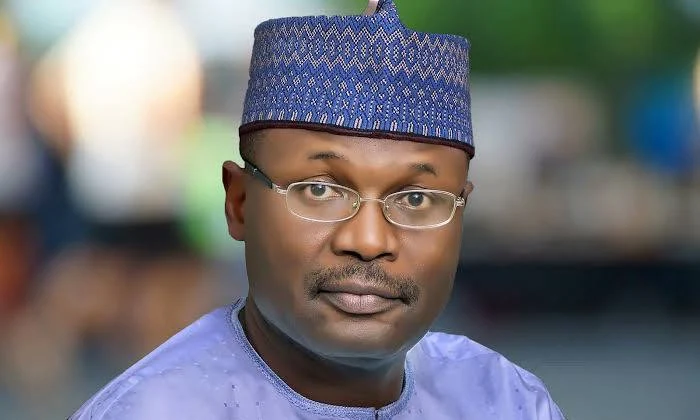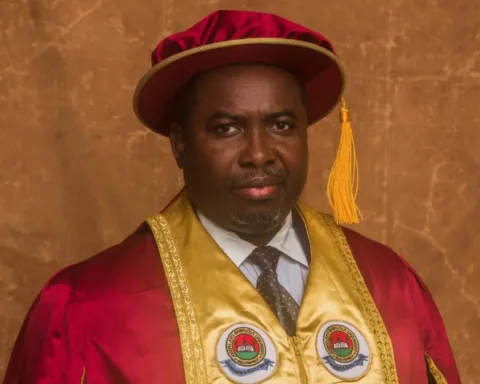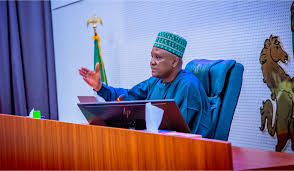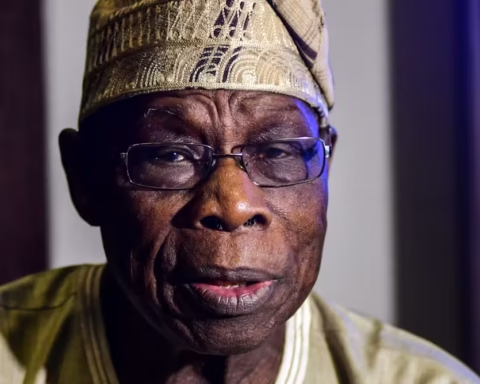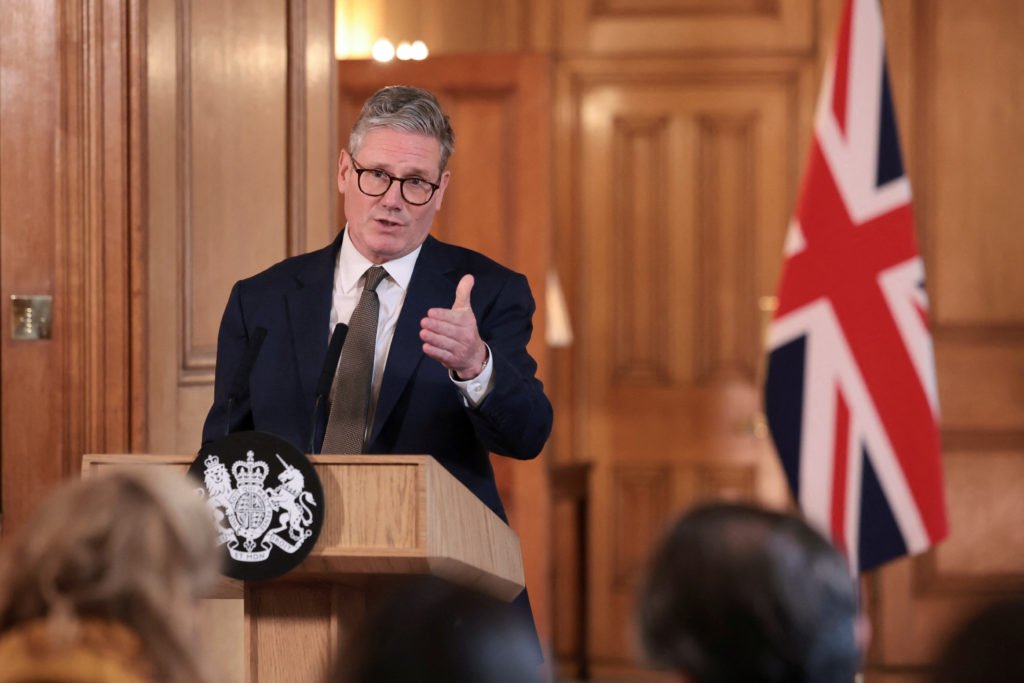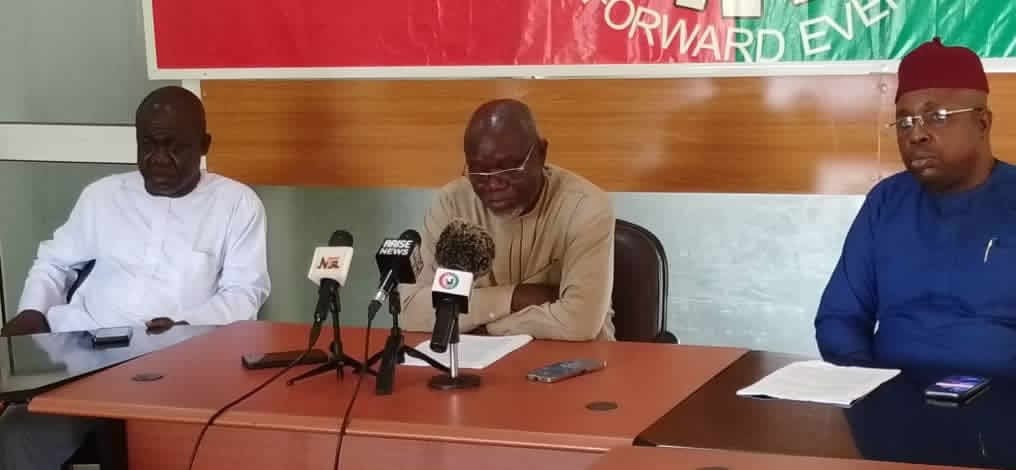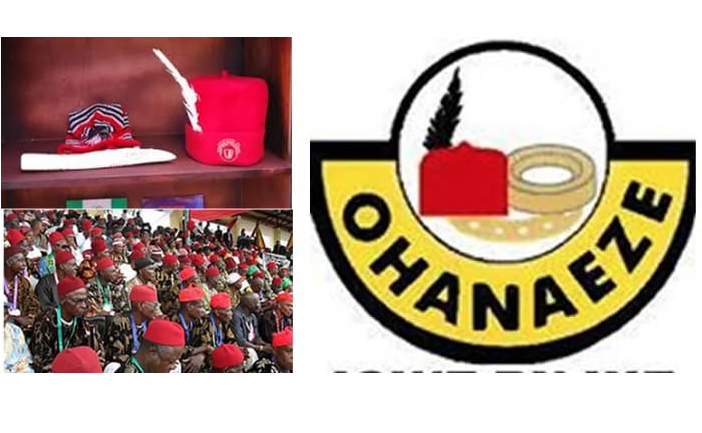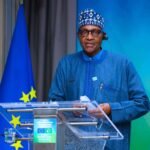By Agbeze Ireke Kalu Onuma, AI-KO
Professor Mahmood Yakubu’s decade at the helm of Nigeria’s Independent National Electoral Commission will ultimately be remembered for its unfulfilled potential and profound regression in electoral integrity. His tenure, the longest in the commission’s history, culminated on October 7, 2025, not with a celebration of democratic consolidation, but with his resignation and handover to the oldest national commissioner, May Agbamuche-Mbu, as acting chairman. This departure marks a critical juncture to audit an era that began with high promise but deteriorated into one of the most contentious and disappointing periods for Nigerian democracy, a stark contrast to the historic 1993 election overseen by Professor Humphrey Nwosu, which remains “the most credible, freest and fairest election in Nigeria’s history”.
He assumed office on November 9, 2015, appointed by President Muhammadu Buhari. A distinguished academic with a first-class degree in history and a PhD from the University of Oxford, his credentials suggested a leader equipped for the rigors of election management. In 2020, he was reappointed, making him the first INEC chairman to serve two full terms, a testament to the initial confidence in his leadership. His tenure was arguably the most ambitious in terms of…
The 2023 general elections were not merely a failure but a catastrophic betrayal of the trust Nigerians had placed in Yakubu’s INEC. It was the election where the commission’s promises, built over nearly a decade, were put to the test and were found grievously wanting. The technological tools that were supposed to herald a new dawn became instruments of public disillusionment. The most symbolic failure was the catastrophic malfunction of the IReV portal. The commission had repeatedly assured the nation that results from polling units would be uploaded in real-time, a measure that would have allowed for independent verification and built immense public confidence. Instead, the system failed for days during the presidential election, creating a vacuum filled with suspicion and allegations of malpractice. This was not a minor glitch; it was a fundamental failure that struck at the heart of the election’s credibility and shattered the covenant of transparency INEC had established with the citizenry. As Austin Aigbe of the West Africa Democracy Solidarity Network noted, “Unfortunately, technical glitches during the 2023 elections eroded the credibility of an otherwise progressive innovation”.
Beyond technology, the elections were marred by significant logistical failures. Widespread reports emerged of late arrival of officials and materials, disenfranchising countless voters. The management of the complex logistics across Nigeria’s 176,000 polling units, which the commission had previously managed with relative improvement, appeared to unravel. These operational hiccups, compounded by security challenges, disrupted the voting process and further eroded confidence in the commission’s capacity. The aftermath of the 2023 elections was dominated by legal challenges, keeping the nation in a state of political limbo for months. While litigation is part of the democratic process, the scale and intensity of the disputes following the 2023 polls were a direct indictment of INEC’s handling of the election. The “legacy of independence” that Yakubu sought to build was critically damaged, with many Nigerians and international observers questioning the commission’s autonomy under political pressure.
However, the failures of the Yakubu era extended far beyond mere technical glitches and logistical incompetence, sinking into a deeper mire of systemic corruption and institutional compromise. A glaring and undeniable corruption was the blatant politicization of appointments to the commission itself. As documented by Yiaga Africa, since 2015, all appointments to INEC have been marred by controversies due to the appointment of partisan individuals. This evolved into a “troubling trend of appointing individuals with limited or no experience in elections,” where “cronies and relatives of ministers and governors are being appointed to the commission, while competent and experienced individuals are ignored”.
This was not an accident but a deliberate strategy of institutional capture, turning an body meant to be an impartial arbiter into a patronage network. The most striking episode was in 2022, when late President Buhari nominated his media aide and well-known partisan campaigner as a national commissioner, a move only thwarted by vigorous civil society opposition and Senate rejection. This pattern of appointing loyalists and partisans fundamentally corrupted INEC’s structural integrity from within, ensuring that its leadership was never truly independent and setting the stage for the operational failures that would follow.
The culture of impunity fostered under Yakubu’s watch was further evidenced by INEC’s blatant refusal to act as a gatekeeper against corrupt politicians, effectively becoming an accomplice to criminality by acquiescence. The electoral commission made a conscious choice to turn a blind eye to allegations of certificate forgery, allowing individuals with fraudulent credentials to scale through all layers of scrutiny – security, parliamentary, and government apparatus. As Peter Obi vehemently argued, “INEC makes no effort to scrutinise certificates before the elections, overlooks complaints of forgery and when you challenged after the elections, court will dismiss the serious criminal issues as ‘pre-election matters’ without giving this criminal act appropriate punishment”. This deliberate inaction created a system where, as Obi lamented, Nigeria has become a “crime scene” and those whose integrity should be exemplary have become “the very source of the nation’s decay”. By refusing to vet candidates and investigate serious criminal allegations, the commission under Yakubu abandoned its constitutional duty, rewarding deceit with political power and sending a devastating message to young Nigerians that dishonesty is a viable path to public office.
The most glaring conjecture of a government steeped in corruption is the scandal involving Minister of Innovation, Science, and Technology, Uche Nnaji, who was found to have presented forged certificates from the University of Nigeria, Nsukka (UNN) and the National Youth Service Corps (NYSC). The university itself disowned the degree certificate, stating in an official letter that Nnaji “did not complete the programme and therefore could not have been issued a graduation certificate”. This scandal, unfolding under President Tinubu’s administration, prompted senior lawyer Prof. Konyinsola Ajayi (SAN) to advise that the minister should “do the honourable thing and resign,” while human rights advocate Prof. Chidi Anselm Odinkalu starkly noted that Nnaji is “neither the first nor likely the last in the current administration to present questionable credentials,” adding that the “government is reportedly full of individuals with forged documents, criminal records, or sometimes both”. The fact that such a individual could be screened and confirmed by the Senate, and then remain in office despite the allegations, speaks volumes about the systemic corruption that flourished during Yakubu’s era and continues to taint the political landscape. It reveals a governance structure where, as Odinkalu concluded, “the only standards that seem to matter are criminal ones”, a standard that the electoral commission failed to counter.
To view the 2023 debacle as an isolated incident is to misread Yakubu’s entire tenure. It was, in fact, the culmination of a pattern of recurring issues that were never decisively resolved. Throughout his time in office, Yakubu consistently highlighted the challenge of an unstable legal framework, appealing for “expeditious consideration of the electoral reform proposal” by the National Assembly. While this is a valid concern, it also serves as a recurring justification for the commission’s shortcomings. A truly transformative leader would have mounted immense public and political pressure to ensure the necessary legal backbone was in place well ahead of a major election, rather than citing its absence as a mitigating factor for failure.
This structural flaw in Nigeria’s electoral system has been aptly described as “a grandstanding deceit for the principal beneficiary of electoral manipulation to appoint the INEC Chairman,” according to former Interior Minister Rauf Aregbesola. Yakubu’s INEC was excellent at procuring technology but failed in its consistent and trustworthy application. The promise of BVAS and IReV was never fully realized in the heat of a contested national election. This created a dangerous perception that technology in the hands of an unreliable institution can become a tool for obscuring malpractice rather than preventing it. The failure to adequately stress-test systems, develop foolproof contingency plans, and ensure the resilience of digital infrastructure represented a critical leadership failure. This gap between innovation and implementation reflects what critics have termed a tenure where “technology without integrity is specious, not transformational”, leaving behind an INEC that is “trained in logistics but not in ethics, fluent in acronyms but silent on accountability”.
The fundamental flaw in Nigeria’s electoral system lies in its foundational architecture, particularly the appointment process that renders INEC vulnerable to political capture. As Samson Itodo of Yiaga Africa warns, “Since 2015, all appointments to INEC have been marred by controversies due to the appointment of partisan individuals to the commission”. This pattern has continued with “a troubling trend of appointing individuals with limited or no experience in elections,” where “cronies and relatives of ministers and governors are being appointed to the commission, while competent and experienced individuals are ignored”.
The solution, as proposed by the Inter-Party Advisory Council, is establishing an independent body to appoint INEC’s leadership, composed of “representatives from all registered political parties, civil society organisations, the National Judicial Council, and a committee of the National Assembly drawn from both the majority and minority caucuses”. This structural reform is crucial because, as Itodo starkly puts it, “Elections are only as credible as the institutions that manage them. If the president continues to wield the power to appoint, it undermines the neutrality of INEC in the eyes of the public”.
The consequences of this flawed system extend far beyond technical malfunctions, creating what Dakuku Peterside identifies as a “legitimacy gap” where “when citizens suspect that laws are ambiguous, that results may not be transparent, that offenders go unpunished, and that security agencies appear uneven or partisan, they withdraw their trust”. This explains Nigeria’s alarming voter turnout decline from 57% in 2007 to just 26.7% in 2023 – the lowest since the return to civilian rule – representing “democracy’s vital sign, and ours has been fading”.
Professor Mahmood Yakubu’s resignation closes a pivotal chapter, leaving behind a complex legacy of an INEC that is, on paper, more modern and technologically equipped than ever before, but one whose credibility is at a historic low. The frameworks for transparency exist, but the will to implement them faithfully in the face of political pressure was found lacking. His tenure stands as a stark lesson that in election management, the appearance of integrity is just as important as its reality, and that technological tools are only as trustworthy as the institution that wields them.
Perhaps the most profound loss under Yakubu’s watch was the erosion of a generation’s democratic faith. Nigeria is a nation with a youth population bursting with potential, yet the 2023 election cycle, instead of harnessing this energy, became a masterclass in disillusionment. We witnessed the heartbreaking spectacle of millions of young, first-time voters – the so-called “Obidients” and others who believed the promise of a new Nigeria – engaging with the electoral process with an intensity rarely seen. They endured endless queues for their PVCs, mobilized on social media, and turned out on election day, believing that the BVAS and IReV were their allies. The subsequent “technical glitches,” the inexplicable failure to upload results, and the eventual outcome felt like a collective betrayal orchestrated by the establishment.
The message was clear: your passion is naive, your votes are negotiable, and the system is designed to preserve the status quo. This is not merely a political setback; it is a profound social tragedy. The cynical resignation and mass apathy that followed are a far more dangerous threat to the nation’s stability than any disputed election result. We have lost what Professor Attahiru Jega’s 2015 election briefly offered: a sense that the political system could, however imperfectly, respond to the people’s will. Under Yakubu, that door was slammed shut, and we are now reaping the whirlwind of a disengaged, cynical citizenry who believe that change through the ballot box is a fool’s errand .
Furthermore, Nigeria lost its claim to regional moral leadership and squandered a pivotal opportunity for democratic consolidation. At a time when West Africa is besieged by military coups in Burkina Faso, Guinea, Mali, and Niger, Nigeria’s role as a democratic bulwark was more critical than ever. Yakubu himself lamented this regional democratic recession at ECONEC meetings, yet he failed to see how his commission’s performance directly contributed to this bleak picture. The flawed 2023 elections provided a perfect pretext for authoritarian elements across the region to scoff at democracy, asking, “If Nigeria, with all its resources and boast of being Africa’s largest democracy, cannot conduct a credible election, why should we bother?”
We lost the moral authority to champion democracy abroad because we failed to nurture it at home. The regression was stark. From the high-water mark of the 2015 election, which saw a peaceful transfer of power, we descended into the murky, contested legitimacy of 2023. This was not progress; it was a deliberate retreat. The “gains recorded in some past elections… could not be replicated,” and the credibility attained after the Uwais reforms was gradually eroded . Under Yakubu, INEC did not just manage a flawed election; it actively managed the decline of Nigeria’s democratic prestige on the continent, making us an object of pity and derision rather than a beacon of hope.
Finally, and most insidiously, we lost the very concept of a sacred mandate. Yakubu’s INEC presided over the final commodification of the Nigerian vote. The election became a theater where technology was a prop, procedures were obstacles to be circumvented, and the will of the people was merely the opening bid in a protracted legal and political bargaining process. The commission’s failure to decisively punish infractions, its seeming powerlessness against brazen vote-buying, and its opaque collation processes reduced the ballot from a sovereign expression to a mere suggestion. This created a political environment where “the inheritor of a fraudulent mandate” faces no consequence, and the nation is forced to “digest stolen mandates with impunity” . The legacy of this is a governance crisis. Leaders who emerge from a process widely perceived as illegitimate lack the moral foundation to make difficult decisions, unite a fractious nation, or command true authority. They govern not by the consent of the governed, but by the permission of the courts and the power of incumbency. By failing to protect the sanctity of the process, Yakubu’s INEC did not just rob a candidate or a party; it robbed the entire nation of the possibility of legitimate, purposeful, and respected governance for years to come. The commission became, as one editorial so eloquently put it, “a cathedral of compromise,” and we are all now worshipping in the hollowed-out sanctuary of a democracy that has lost its soul.
In a move that has stunned observers and cemented the narrative of a political class utterly divorced from the lived experiences of ordinary citizens, President Bola Tinubu chose to confer the national honour of Commander of the Order of the Niger (CON) upon Professor Mahmood Yakubu as he departed office . This award, a recognition of “dedicated service to the nation,” was bestowed for what the Presidency described as Yakubu’s “efforts to sustain Nigeria’s democracy, particularly through the organisation of free and fair elections throughout his two-term tenure” . The bestowal of the CON – an honor typically reserved for state governors, lawmakers, senior advocates, and top cabinet members – for presiding over the very electoral exercises that fractured national trust, is not merely a contradiction; it is a profound insult to the collective intelligence of the Nigerian electorate. It represents the final, gleaming layer of whitewash on a decade of profound institutional decay, a symbolic act where the state rewards the manager for a project whose failure has cost the people everything.
Across the nation, a single, anguished question echoes: “For what is he being honored?” This public outcry, vividly captured on social media and in public discourse, is not a matter of partisan grievance but a fundamental cry for accountability. Nigerians are left to wonder if the honor is “for doing a dishonorable job?” or, more cynically and damningly, “for rigging him [Tinubu] in?” . The reactions to Senator Shehu Sani’s attempt to defend Yakubu were swift and merciless, with citizens declaring that the former INEC chairman “gave nothing. He ruined our elections,” and “gave us nothing but disaster”. This award, therefore, does not sanctify Yakubu’s legacy; it permanently tarnishes the value of the national honor itself. It signals that the ultimate prize in our democracy is not integrity, but loyalty; not transparent service, but successful execution of a political assignment, however ethically bankrupt it may be. The message to future public servants is catastrophic: you will be judged not by the people you serve, but by the powerful interests you placate.
This state-sanctioned celebration of failure marks the final, formal capture of democratic institutions by the very forces they are meant to regulate. When a president honors an electoral chief whose tenure is defined by legal battles and a crisis of credibility, he is not rewarding excellence; he is validating a system that works for the powerful at the expense of the populace. The award is a stark declaration that the official narrative of “free and fair” elections will be maintained, regardless of the overwhelming evidence to the contrary witnessed by millions. It is the closing of ranks, an attempt to launder a legacy of “technical glitches” and shattered trust into a record of patriotic service . For the nation, this moment is more than a controversy; it is a dangerous precedent. It teaches young Nigerians that the path to national recognition is not through principled conduct but through complicity. As we look to the future, the struggle for democracy must now include the fight to reclaim the very meaning of honor from those who have so brazenly devalued it.
Professor Mahmood Yakubu’s resignation signals the close of a consequential and often turbulent era in Nigeria’s democratic evolution. His years at the helm of the Independent National Electoral Commission (INEC) reshaped the institution’s structure and operations, introducing unprecedented levels of digitalization and procedural reform. Under his leadership, INEC adopted technologies such as biometric verification, electronic transmission of results, and improved voter registration systems – initiatives that, in theory, positioned the commission as a modern electoral body aligned with global best practices.
Yet, the promise of these innovations was often overshadowed by persistent questions about credibility, transparency, and institutional independence. While the frameworks for accountability were meticulously designed, their consistent and impartial application proved elusive. Political interference, logistical failures, and inconsistent communication eroded public confidence, leaving many Nigerians skeptical of the very systems meant to guarantee fairness. The gap between technological advancement and ethical execution became a defining paradox of Yakubu’s tenure.
His departure therefore invites a deeper reflection on the nature of electoral reform itself. It reveals that modernization alone cannot substitute for moral courage or institutional integrity. Transparent elections depend not merely on tools and procedures but on the sincerity of those entrusted with implementing them. The credibility of any democratic process rests as much on perception as on practice – when citizens lose faith in the impartiality of an electoral umpire, even the most sophisticated systems lose their legitimacy.
Ultimately, Professor Yakubu’s legacy is a study in contrasts: progress and controversy, innovation and mistrust, ambition and limitation. His time in office demonstrates that the strength of democracy lies not only in adopting new technologies but in nurturing the political and ethical will to use them justly. The next phase for INEC, and indeed for Nigeria’s democracy, must therefore move beyond modernization toward genuine institutional integrity – where transparency is not merely codified in policy but practiced in every decision, every process, and every election.
As President Tinubu is expected to appoint a substantive successor, the task is not merely to find a new chairman, but to embark on a profound process of institutional soul-searching. The next INEC chairman must be a person of unimpeachable character, an operational realist, and a leader who can rebuild the shattered trust of the Nigerian people. We must learn from the Yakubu years that ambition without flawless execution is a recipe for disaster. For Nigeria’s democracy to recover, the next era of INEC must be defined not by promises of what technology can do, but by a demonstrable, unwavering commitment to transparency and integrity in every single electoral process, ensuring that the commission becomes what it was always meant to be: a genuine embodiment of the people’s will rather than, as so eloquently described, “a cathedral of compromise”. The future of the nation’s democratic experiment depends on this fundamental transformation, where the vote is no longer “treated as theatre and the people as props” but as the sacred foundation of legitimate governance.
